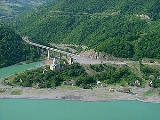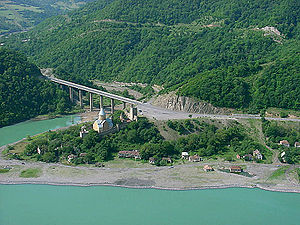
The Patricide
Encyclopedia
The Patricide is a novel
by Alexander Kazbegi
, first published in 1882. The novel is a love story, but it also addresses many socio-political issues of 19th century Georgia
. The novel portrays critical realism
of the 19th century.
, which is a historical region of northern Georgia around the Kazbeg mountain.
Alexander Kazbegi was an ethnographer who grew up in Khevi, and as such was quite familiar with the life of the mountaineer. The novel is written in Medieval Georgian
, which is also the dialect of northern Georgians.
The author also addresses political issues, such as the importance of self-selected government. At the time, the governors of the region were appointed by Russian authorities. Also, Russian authorities used cossack
soldiers to occupy Georgia and their disrespectful behavior made the situation even worse.
 The novel takes place in 19th century Georgia, when Georgia was occupied by the Russian Empire. It is a love story of Iago, a peasant boy, and Nunu, a beautiful young woman. Nunu's mother died early, and since her father (a member of the coalition army in the Shamil rebellion
The novel takes place in 19th century Georgia, when Georgia was occupied by the Russian Empire. It is a love story of Iago, a peasant boy, and Nunu, a beautiful young woman. Nunu's mother died early, and since her father (a member of the coalition army in the Shamil rebellion
) is too poor to care for her, she lives with her uncle's family. They disapprove of her match with Iago, as they consider him a mere Plebe
. Instead, they are sympathetic towards Grigola, the tyrannical village governor appointed by the Russians. Grigola is married, but in love with the beautiful Nunu. He convinces her family that his brother would like to wed her, though Grigola intends to keep Nunu as his own mistress.
To get Nunu, Grigola realizes that he has to get rid of Iago first. Grigola accuses him of stealing state property and gives orders to lock him up in the Ananuri fortress
. He then kidnaps and rapes Nunu. Koba, Iago's best friend, witnesses the kidnapping. He fights through Grigola's men to rescue Nunu, but he is too late. Koba swears revenge against Grigola for his shameful behavior.
Koba and another friend break Iago out of jail, and they all decide to flee to the Northern Caucasus and hide in Chechnya
, since Russian police and Cossacks are looking for them all over Georgia. Despite the fact that many Georgians were fighting on the Russian side, Shamil receives them and offers protection. The author portrays Chechens as free men who fight for their freedom, in contrast to the Georgians, who were kept on a short leash by people like Grigola, unable even to hold town meetings (a tradition since the Middle Ages).
Meanwhile, Nunu escapes from Grigola. Koba manages to contact her and tells her to meet them in Vladikavkaz
in North Ossetia, along with her father. The night before Iago and Nunu are supposed to see each other again, Iago and Koba's host decides to inform Grigola of their whereabouts, hoping to receive their horses in exchange for the information. After midnight, Grigola shows up and murders Iago, the friend, and Nunu's father, hoping to pin the latter on Nunu and thus have an excuse to send her to Siberia
. Koba escapes Grigola's wrath, but upon discovering both her lover and father murdered, Nunu dies from grief.
At the end of the story, Koba exacts his revenge for both Iago and Nunu by shooting Grigola and his supervisor in a cab in the forest. Koba is the hero of the story, who respects friendship, defends truth, respects women, and enforces justice.
by Joseph Stalin
, who was born in Georgia. Koba's vengeful characteristics, embodiment of traditional Georgian knightly ideals, and his simplistic moral code of honesty and loyalty appealed to Stalin, legitimizing his illicit operations as he turned to revolutionary activity.
Novel
A novel is a book of long narrative in literary prose. The genre has historical roots both in the fields of the medieval and early modern romance and in the tradition of the novella. The latter supplied the present generic term in the late 18th century....
by Alexander Kazbegi
Alexander Kazbegi
Alexander Kazbegi was a Georgian writer, famous for his 1883 novel The Patricide.Kazbegi was the great grandson of Kazibek Chopikashvili, a local feudal magnate who was in charge of collecting tolls on the Georgian Military Highway...
, first published in 1882. The novel is a love story, but it also addresses many socio-political issues of 19th century Georgia
Georgia (country)
Georgia is a sovereign state in the Caucasus region of Eurasia. Located at the crossroads of Western Asia and Eastern Europe, it is bounded to the west by the Black Sea, to the north by Russia, to the southwest by Turkey, to the south by Armenia, and to the southeast by Azerbaijan. The capital of...
. The novel portrays critical realism
Realism (arts)
Realism in the visual arts and literature refers to the general attempt to depict subjects "in accordance with secular, empirical rules", as they are considered to exist in third person objective reality, without embellishment or interpretation...
of the 19th century.
Analysis
The story is told from the third person perspective. It takes place in KheviKhevi
Khevi is a small historical-geographic area in northeastern Georgia. It is included in the modern-day Kazbegi district, Mtskheta-Mtianeti region...
, which is a historical region of northern Georgia around the Kazbeg mountain.
Alexander Kazbegi was an ethnographer who grew up in Khevi, and as such was quite familiar with the life of the mountaineer. The novel is written in Medieval Georgian
Georgian language
Georgian is the native language of the Georgians and the official language of Georgia, a country in the Caucasus.Georgian is the primary language of about 4 million people in Georgia itself, and of another 500,000 abroad...
, which is also the dialect of northern Georgians.
The author also addresses political issues, such as the importance of self-selected government. At the time, the governors of the region were appointed by Russian authorities. Also, Russian authorities used cossack
Cossack
Cossacks are a group of predominantly East Slavic people who originally were members of democratic, semi-military communities in what is today Ukraine and Southern Russia inhabiting sparsely populated areas and islands in the lower Dnieper and Don basins and who played an important role in the...
soldiers to occupy Georgia and their disrespectful behavior made the situation even worse.
Plot summary

Caucasian War
The Caucasian War of 1817–1864, also known as the Russian conquest of the Caucasus was an invasion of the Caucasus by the Russian Empire which ended with the annexation of the areas of the North Caucasus to Russia...
) is too poor to care for her, she lives with her uncle's family. They disapprove of her match with Iago, as they consider him a mere Plebe
Plebs
The plebs was the general body of free land-owning Roman citizens in Ancient Rome. They were distinct from the higher order of the patricians. A member of the plebs was known as a plebeian...
. Instead, they are sympathetic towards Grigola, the tyrannical village governor appointed by the Russians. Grigola is married, but in love with the beautiful Nunu. He convinces her family that his brother would like to wed her, though Grigola intends to keep Nunu as his own mistress.
To get Nunu, Grigola realizes that he has to get rid of Iago first. Grigola accuses him of stealing state property and gives orders to lock him up in the Ananuri fortress
Ananuri
Ananuri is a castle complex on the Aragvi River in Georgia, about 45 miles from Tbilisi.-History:Ananuri was a castle and seat of the eristavis of Aragvi, a feudal dynasty which ruled the area from the 13th century. The castle was the scene of numerous battles.In 1739, Ananuri was attacked by...
. He then kidnaps and rapes Nunu. Koba, Iago's best friend, witnesses the kidnapping. He fights through Grigola's men to rescue Nunu, but he is too late. Koba swears revenge against Grigola for his shameful behavior.
Koba and another friend break Iago out of jail, and they all decide to flee to the Northern Caucasus and hide in Chechnya
Chechnya
The Chechen Republic , commonly referred to as Chechnya , also spelled Chechnia or Chechenia, sometimes referred to as Ichkeria , is a federal subject of Russia . It is located in the southeastern part of Europe in the Northern Caucasus mountains. The capital of the republic is the city of Grozny...
, since Russian police and Cossacks are looking for them all over Georgia. Despite the fact that many Georgians were fighting on the Russian side, Shamil receives them and offers protection. The author portrays Chechens as free men who fight for their freedom, in contrast to the Georgians, who were kept on a short leash by people like Grigola, unable even to hold town meetings (a tradition since the Middle Ages).
Meanwhile, Nunu escapes from Grigola. Koba manages to contact her and tells her to meet them in Vladikavkaz
Vladikavkaz
-Notable structures:In Vladikavkaz, there is a guyed TV mast, tall, built in 1961, which has six crossbars with gangways in two levels running from the mast structure to the guys.-Twin towns/sister cities:...
in North Ossetia, along with her father. The night before Iago and Nunu are supposed to see each other again, Iago and Koba's host decides to inform Grigola of their whereabouts, hoping to receive their horses in exchange for the information. After midnight, Grigola shows up and murders Iago, the friend, and Nunu's father, hoping to pin the latter on Nunu and thus have an excuse to send her to Siberia
Siberia
Siberia is an extensive region constituting almost all of Northern Asia. Comprising the central and eastern portion of the Russian Federation, it was part of the Soviet Union from its beginning, as its predecessor states, the Tsardom of Russia and the Russian Empire, conquered it during the 16th...
. Koba escapes Grigola's wrath, but upon discovering both her lover and father murdered, Nunu dies from grief.
At the end of the story, Koba exacts his revenge for both Iago and Nunu by shooting Grigola and his supervisor in a cab in the forest. Koba is the hero of the story, who respects friendship, defends truth, respects women, and enforces justice.
Legacy
The character Koba was admired and used as a pseudonymPseudonym
A pseudonym is a name that a person assumes for a particular purpose and that differs from his or her original orthonym...
by Joseph Stalin
Joseph Stalin
Joseph Vissarionovich Stalin was the Premier of the Soviet Union from 6 May 1941 to 5 March 1953. He was among the Bolshevik revolutionaries who brought about the October Revolution and had held the position of first General Secretary of the Communist Party of the Soviet Union's Central Committee...
, who was born in Georgia. Koba's vengeful characteristics, embodiment of traditional Georgian knightly ideals, and his simplistic moral code of honesty and loyalty appealed to Stalin, legitimizing his illicit operations as he turned to revolutionary activity.
External links
- Online version of the novel - http://testireba.ge/authors/authorwork.aspx?AuthorId=53&AuthorWorkId=1987

